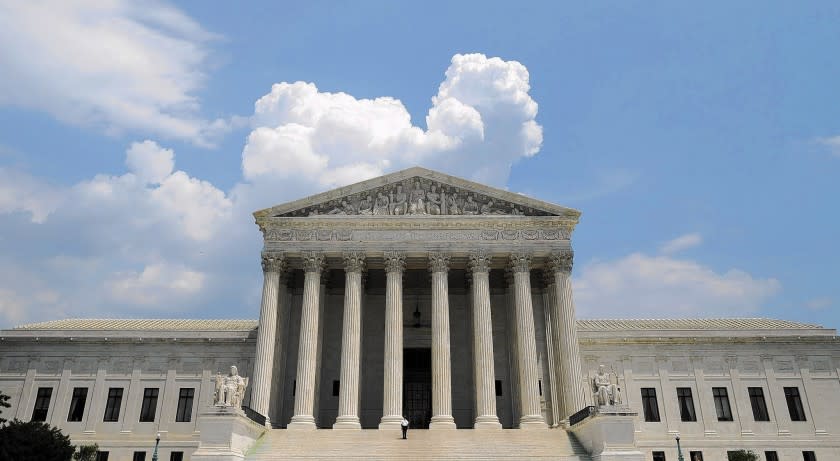Coronavirus pushes Supreme Court to allow first-ever live broadcast of arguments

The Supreme Court undertook its own version of a partial reopening Monday, giving Americans their first chance to listen to a live audio broadcast of oral arguments.
And within the first minutes, listeners encountered another rarity: questions from Justice Clarence Thomas, who usually sits silently through the courtroom arguments.
Responding to the COVID-19 pandemic, the Supreme Court this week began its first-ever oral arguments via a telephone conference. Most of the justices have been working at home and connecting with their colleagues remotely. So after initially postponing several arguments, the court decided to hear several cases via telephone, beginning with a trademark dispute.
In addition, the court permitted the audio to be broadcast live for the first time in its history.
For many, listening to the smart, probing back-and-forth questions over the phone hook-up demonstrated why live audio of Supreme Court arguments should become the new norm, not a temporary response to a pandemic.
“Remind me why they haven’t been doing this all along?” asked Gabe Roth of Fix the Court, a project that has campaigned for more openness from the court. " I really hope this has staying power. Now that we know with certainty that live audio does not impair its functioning, there's no reason for the court to return to its outmoded policy."
For decades, the justices have refused to allow the televising of arguments, believing that lawyers would play to the cameras.
Instead, the court has released audio recordings of the oral arguments at the end of each week, or occasionally with high-profile cases, at the end of the same day. Transcripts are released on the same day.
"It was such a pleasure to hear two truly outstanding women advocates in the very first live audio [Supreme Court] argument," said Carolyn Shapiro, a law professor at the Chicago-Kent College of Law, referring to the female attorneys who argued Monday's case on both sides. "I hope very, very much that this experience will make the justices less skittish about live streaming the audio of arguments routinely."
When the gavel sounded at 10 a.m., Americans nationwide could listen via CSPAN as Chief Justice John G. Roberts Jr. introduced Justice Department attorney Erica L. Ross, who was representing the Patent and Trademark Office. She was given two minutes to introduce her argument, defending the government's decision to refuse to register a trademark for the travel website Booking.com because its name is generic.
The justices quickly plunged into the details of the legal dispute. But unlike during in-person arguments, when justices interrupt freely and frequently, during the remote argument they took turns asking questions in order of seniority.
Roberts spoke first and questioned why the government's lawyer was relying on a 130-year-old case rather than the words of the Trademark Act passed by Congress.
Justice Thomas was recognized next and asked several questions. Thomas has gone many years without asking questions in the court. When he asked a question in 2016, it was the first time in a decade.
There were a few minor glitches during the argument. Justice Sonia Sotomayor may have had the audio on mute and had to be prompted twice to begin her questions. There was a similar delay with one of the attorneys in responding to Roberts.
In addition, the tenor of the argument differed somewhat, probably because of the format. Because the justices were called upon and asked their questions in order of seniority, there were not the usual interruptions and lively cross-talk by justices.
UCLA law professor Adam Winkler said this format "worked well, perhaps even better than the traditional in-person format. The justices did not speak over one another as they typically do, and the advocates were able to answer questions from one justice without interruptions from the others," he said. "Although the court surely will return to in-person arguments, the justices should retain the live audio of the hearings for the people of the nation to hear in real time."
The justices will hear arguments on five more days — Tuesday, Wednesday, May 11, 12 and 13. On Wednesday, the court will consider the Trump administration's plan to shield employers from providing birth control to female employees if they have moral or religious objections. Next Tuesday, the justices will hear President Trump's appeal of court rulings that would require him to disclose his tax returns and financial records to three House committees and a New York prosecutor.
Monday's argument, like many, gave no clear indication about how justices might rule. In the first half-hour, the justices sounded skeptical of the government's argument. But they sounded equally skeptical of Washington attorney Lisa Blatt's argument for why Booking.com should be able to register its trademark. Several of them voiced concern over the possible "monopoly power" if one company could trademark a name like "pizza.com" or "washingmachines.com."

